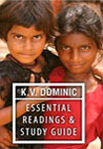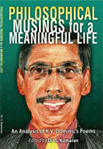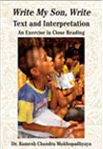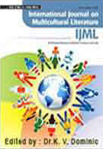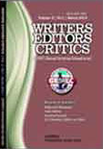Book Details
A Journey from Within to Beyond: A Bunch of Short Stories Culled from Different Cultures – Edited By K. V. Dominic
Year Of Publish:
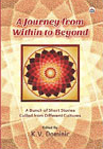
A Journey from Within to Beyond:
A Bunch of Short Stories
Culled from Different Cultures
Â
Â
Edited By
K. V. Dominic
Â
Authorspress, New Delhi
2018
 Â
Preface
It is with immense happiness that I am bringing out this anthology of short stories. This happens to be my 35th book, but only the second edited collection of stories after the first one published in 2010 by Sarup Book Publishers, New Delhi. The first collection entitled Selected Short Stories in Contemporary Indo-Anglian Literature which contained 21 stories won much recognition and was even prescribed for study in a few universities. This acclaim and demand for short story anthologies prompted me to bring out this book. Unlike English poetry anthologies, short story anthologies are very less in number. The reason is very simple–poets are many in our country but story tellers are very few.
The genre of short story is fast changing and there are innumerable types of stories now. A definition of short story is impossible now because of the variety of forms. Edgar Allan Poe, the legend and maestro of short stories tried to define it stating that a short story should be read in one sitting, anywhere from a half hour to two hours. But instead of half an hour reading, just one minute length matter can constitute a good story now. The length can vary from even a sentence to several thousand words. Ten types of stories are now extant: Anecdote, drabble, fable, feghoot, flash fiction or micro fiction, frame story, mini-saga, story sequence, sketch story, and vignette. There are stories with plot and without plot. Very often postmodern stories have no plot at all. Many end incomplete.
There are twenty two short stories in this book, written by writers from different walks of life—retired professors and professors in service, retired civil servants and government employees, professional poets and story tellers, scientists, freelance writers, etc. The stories can be summarised as follows:
Prof. Ramesh K. Srivastava’s “Different from Others†is a story dealing with eunuchs—the third gender. Monika was born as a beautiful eunuch in a Rajput family in Haryana. While other eunuchs used to indulge in inhuman extortions of money from others, Monika attempts to change their attitudes and behaviour so that they could claim a respectable place in the society. By doing so, she would prove to others that she herself was different from others.
Chandramoni Narayanaswamy’s “Post Office Blotting Paper†tells the story of a quarrelsome postmaster who ultimately became an honourable hero to his household, colleagues and the neighbours.
Dr. Sunil Sharma’s “A Fairy Tale Called Hans Christian Andersen†is a radical short fiction, in which the famous spinner of tales, H. C. Andersen, himself becomes the central character of the narrative that hovers between the twin realms of the possible and impossible. It is a literary fiction made relevant to the New Millennium audiences through a clever mix of interpretation of Andersen’s bio and some incidents real and imagined by its writer Sunil Sharma.
P C K Prem through his short story “A Multiple Living†makes a search for answers of questions vague even as unevenness and miasma engulf a man. It is also a thirst for harmony and evocative life of man, who lives within and evaluates life in different grades of life but fails to live analytically and so, he exists in a listless inner world.
Dr. D. C. Chambial’s story “Supreme is His Will†is about the debilitating problems of an old man who once wielded authority in his office but now feels helpless because of geriatric problems. His disease makes him unable to move from his place; so, past memories are his only solace. A story about the psychological study of the man’s mind.
Dr. K. V. Dominic’s “Multicultural Harmony†is a story portraying the indispensible need of harmonious life in a multicultural society. It depicts the reality that culture and religion are man-made whereas man is God-made.
“He and another He†is a poignant short story of Dr. M. K. Chand Raj that evokes dreadful memories of the Gujarat genocide in which thousands of innocents were brutally murdered. It deals with the mysterious disappearance of a Kerala youth, without any clue, who was stranded in Ahmedabad during the massacre.
Chandrashekhar Sastry’s “Triple Talaaq†is a spoof on triple talaaq in which a couple break tradition by an inter-religious live-in.
Dr. Ketaki Datta’s “Sundown for Losers†is a tale of ‘macabre’, of impossible togetherness which a brother and sister innocuously share, though, it might send wrong message to the common reading public. Certain similarities with a real-life incident at Robinson Street, Kolkata in 2016, no doubt, is an immediate inspiration for writing this story.
In Dr. Ramesh Chandra Mukhopadhyaya’s postmodern story “The Odyssus of Paritosh†the hero of the story withdraws himself from the world out and enters into the wilderness of the subconscious and there he meets a crow. Thus the story turns into a fable. The story tells how the cataracts of love show up in course of time. This lesson of yoga philosophy is the theme of the story.
Dr. Manas Bakshi’s story “Unpardonable†is about ageism and cruelty shown to one’s aged mother by deserting her in an Old Age Home paying little attention or visit.
Anil K. Sharma’s “The Professor of English Literature†tells the predicament of hyper sensitive Shekhar who had left the profession of an English Literature Professor long ago to pursue job in a multi-national company. Only ruins and remnants remained honking in the corner of his mind which bore the testimony that once upon he was a professor, but he still had the vivid memorabilia of his passionate college days.
Dr. Poonam Dwivedi’s “The Visiting Card†is the story of Nupur, a young accomplished girl, falling in love with an aspirer boy of the University of Allahabad. Both enjoy the company of each other. The professors feel envious of the ‘couple’ but the stroke of luck creates gulf never to be fulfilled with the emotional longing. The craving remains till the end of the story.
Biplab Majee’s “Triangle†is a postmodern love story which is entangled in a triangle of or quardrangle of love. On another level it is a story which is associated with sex. The story reiterates that neither law nor religious rituals can help in forging the true marriage of minds.
Dr. Usha Sreedhar’s “Bold Step†is the story of a young, small-town woman whose life changes after the sudden death of her husband. She takes up a job; educates her son well and supports her family. She dedicates her life to serve and help the unfortunate in society. In the process she breaks from an orthodox past to emerge as a sensitive and progressive woman.
Pankajam K. through her short story “Preys†tells of a sexual violence against a four year old girl Lasya, the only child of the couple Divya-Ramesh, as a result of which the child develops serious health issues and succumbs to it. The incident takes place at the school and the perpetrator is a teacher, on whom the society bestows so much respect. The story intends to sensitize the society on the need to protect children from these heinous crimes.
Padmaja Iyengar-Paddy’s “Maya didn’t Go…â€Â is the story of a contemporary Indian reality especially in rural India, where rapes and murders often go unreported both at the police station and by the media, where vigilante justice is common.
Dr. Sabita Chakraborty’s story “The Realization of Sarama†is about the attachment one has for the house and its premises where one lived for several years and nurtured many plants and trees. Leaving it is highly painful.
Biswanath Kundu’s “Attitude Makes a Difference†is the story of a smart boy whose self confidence and possession of precious attitude–attitude to crack anything with devotion, dedication and determination—rewarded him success in life.
“Stomping Mud Puddlesâ€, the short story by Dr. Molly Joseph is a graphic portrayal of trip to Goa by two teachers and a favourite batch of students. In course of this story, like stomping mud puddles which offers excitement as well as slips unpredictable, the teachers and students encounter hazards and hurdles.
Dr. Rita De’s “Churning of the Illusion†is a postmodern story telling the conflict of a girl fleeing from her house. It focuses her predicament when her identity was found out by a fellow teenager passenger.
Chandramoni Narayanaswamy’s second story in the book “The Invisible Penalty†speaks of an advocate’s ingenuity in cheating the court for grabbing the fee from the customer.
Before winding up my preface let me express my deep gratitude to my bosom friend and publisher Shri Sudarshan Kcherry of Authorspress, New Delhi for happily accepting this book. The great philosopher-critic-publisher Sudarshan-ji has a major role in moulding me as a writer. He is such a humane motivator and promoter of literature that more than two dozens of my books have come out from his world renowned publishing house. A million thanks to him! I wish all lovers of short stories an enlightening and entertaining voyage through this book!
–Dr. K. V. Dominic
Â
Â
Â
Â
Contents
Â
Different from Others
–Prof. Ramesh K. Srivastava
Post Office Blotting Paper
–Chandramoni Narayanaswamy
A Fairy Tale Called Hans Christian Andersen
Â
–Dr. Sunil Sharma
Â
A Multiple Living
–P C K Prem
Supreme is His Will
–Dr. D. C. Chambial
Multicultural Harmony
–Dr. K. V. Dominic
He and another He
–Dr. M. K. Chand Raj
Talaaq
–Chandrashekhar Sastry
Sundown for Losers
–Dr. Ketaki Datta
The Odysseus of Paritosh
–Dr. Ramesh Chandra Mukhopadhyaya
Unpardonable
–Dr. Manas Bakshi
The Professor of English Literature
–Anil K. Sharma
The Visiting Card
–Dr. Poonam Dwivedi
Â
Triangle
–Biplab Majee (Trans. Dr. Ramesh Chandra Mukhopadhyaya)
Â
A Bold Step
–Dr. Usha Sridhar
Preys
–Pankajam K.
Maya Didn’t Go …
Â
–Padmaja Iyengar-Paddy
Â
The Realization of Sarama
–Dr. Sabita Chakraborty
Attitude Makes a Difference
–Biswanath Kundu
Stomping Mud Puddles…
–Dr. Molly Joseph
Churning of the Illusion
–Dr. Rita De
Invisible Penalty
–Chandramoni Narayanaswamy
Contributors

